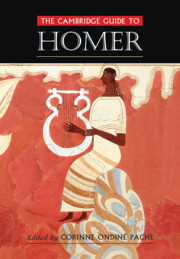Book contents
- The Cambridge Guide to Homer
- The Cambridge Guide to Homer
- Copyright page
- Contents
- Figures
- Notes on the Contributors
- General Introduction
- Part I Homeric Song and Text
- Part II Homeric World
- Part III Homer in the World
- Introduction
- Homer in Antiquity
- Homer and the Latin West in the Middle Ages
- Homer in Greece from the End of Antiquity 1: The Byzantine Reception of Homer and His Export to Other Cultures
- Homer in Greece from the End of Antiquity 2: Homer after Byzantium, from the Early Ottoman Period to the Age of Nationalisms
- Homer in Renaissance Europe (1488‒1649)
- Homer in Early Modern Europe
- The Reception of Homer since 1900
- Homer: Image and Cult
- Key Topics
- Bibliography
- Index
- References
Homer and the Latin West in the Middle Ages
from Part III - Homer in the World
Published online by Cambridge University Press: 22 February 2020
- The Cambridge Guide to Homer
- The Cambridge Guide to Homer
- Copyright page
- Contents
- Figures
- Notes on the Contributors
- General Introduction
- Part I Homeric Song and Text
- Part II Homeric World
- Part III Homer in the World
- Introduction
- Homer in Antiquity
- Homer and the Latin West in the Middle Ages
- Homer in Greece from the End of Antiquity 1: The Byzantine Reception of Homer and His Export to Other Cultures
- Homer in Greece from the End of Antiquity 2: Homer after Byzantium, from the Early Ottoman Period to the Age of Nationalisms
- Homer in Renaissance Europe (1488‒1649)
- Homer in Early Modern Europe
- The Reception of Homer since 1900
- Homer: Image and Cult
- Key Topics
- Bibliography
- Index
- References
Summary
Manuscript copies of the Homeric epics were not available in Western Europe from the end of antiquity until the early modern period. In the absence of the Homeric epics, the matter of Troy was transmitted to the Latin West by three short Latin texts, the prose texts by Dares the Phygian, de excidio Troiae historia, Dictys the Cretan, Ephemeris belli Troiani, as well as the short verse epitome, the Ilias latina. From these texts a vast and imaginative textual tradition on the matter of Troy develops.
- Type
- Chapter
- Information
- The Cambridge Guide to Homer , pp. 435 - 443Publisher: Cambridge University PressPrint publication year: 2020

